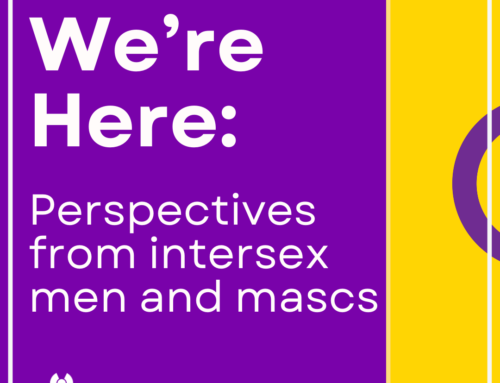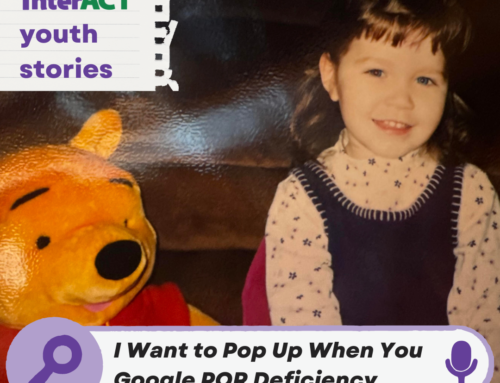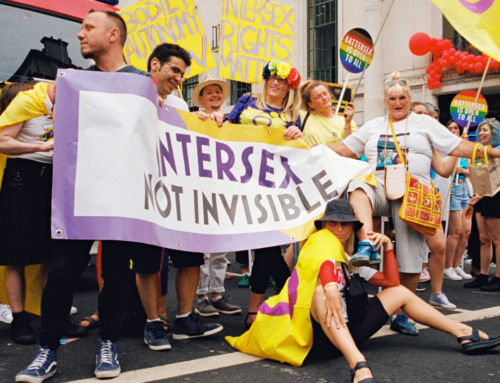By Georgiann Davis, Ph.D.
 When I was a teenager I phoned The Jerry Springer Show seeking help in resolving my family’s conflict around finances. My working-class family and I saw the show as a legitimate source of assistance. The show didn’t return my call, but my search for help was very real.
When I was a teenager I phoned The Jerry Springer Show seeking help in resolving my family’s conflict around finances. My working-class family and I saw the show as a legitimate source of assistance. The show didn’t return my call, but my search for help was very real.
Roughly 20 years later I was speaking to a producer of The Dr. Phil Show about an upcoming episode where parents of an intersex child would share their struggles with one another over the formation of their child’s gender identity—a four-year old child named Aubrey. Within 72 hours, and thanks to Skype, I was on the Dr. Phil set ready to share my personal and professional experience with intersex. My hope was that I could help these parents, or anyone else with intersex experience, understand that gender was fluid and contextual. Mostly, though, I just wanted viewers to know intersex was a normal and natural variation.
When the show previewed on the internet, I heard a number of valid and serious concerns about the episode most of which centered on 1) the invasion of Aubrey’s privacy 2) how the Dr. Phil show was the wrong platform for positive change, and 3) how my involvement offered the show legitimacy. Since the episode aired on November 30, 2015, I’ve been thinking a lot about these concerns. This blog post is my attempt at openly sharing my reflections about the show, and more generally, my thoughts about privacy, visibility, and legitimacy in the media.
Before I was invited to be on the show a producer interviewed me about my experience with intersex, both as an intersex person and as a researcher. The producer also gave me some background information about the family’s particular situation, but I wasn’t aware that the child at its center would be publicly exposed on air through home videos. Truthfully, I didn’t even think to inquire about such before agreeing to be on the show. Everything was happening very quickly, and before I knew it, the show was being pre-recorded, and as I sat in my university office waiting over Skype on standby, I cringed when Aubrey’s home videos were being shown. Like those who raised concerns when the show was aired, I was concerned that the 4-year-old’s rights to privacy were disregarded. I knew that this episode would forever be available, regardless of Aubrey’s wishes. But, at the same time, I started thinking about the thin line between “privacy” and “shame.” How do we determine when “privacy” is necessary, and is it possible that our “privacy” concerns unintentionally perpetuate “shame”? To put it another way, would we (myself included) be worried about a child’s privacy if we were talking about another aspect of one’s body not related to intersex? For example, do you remember Batkid? Miles was 5-years-old when he was paraded, literally, in the streets of San Francisco as a superhero. His experience with cancer was noted along with every story that he appeared in across media outlets. Even President Barack Obama joined the media frenzy! This has all got me wondering: what about Miles’ privacy? If Miles’ experience with cancer doesn’t need to be kept private, why does Aubrey’s experience with intersex need secrecy? Now, please make no mistake, I’m not saying these two situations are the same. After all, Miles requested to be Batkid. I’m also not disagreeing with those who feel Aubrey’s privacy was violated when they appeared, through home videos, on the Dr. Phil Show, but I am wondering if we might think about the thin line between “privacy” and “shame.”
Miles’ experience with cancer was covered by an array of media outlets ranging from the San Francisco Chronicle to CNN to NPR, and it was reported that the event was tweeted about on twitter over 400,000 times. Clever Girls Collective estimated Miles’ story, through various media outlets, reached 750 million-1.7 billion people across the world. Presented by the Dr. Phil Show, Aubrey’s story wasn’t tweeted about even close to 400,000 times, nor did their story make such a media wave. This leaves me wondering, why didn’t the world give Aubrey’s intersex experience the same attention they did when referring to Miles’ experience with cancer? Of course, I don’t think cancer and intersex are equitable—not at all; however, with that said, I do feel that society’s discriminatory view of intersex is something all intersex people struggle with on a day-to-day basis. Because of narrow understandings of sex, gender, and even sexuality, intersex kids do face marginalization and ostracization from their peers, teachers, and in some cases, even their families. Perhaps the reason why Aubrey didn’t receive the same attention as Miles is because of the platform on which they appeared. Several folks across the intersex community suggested the Dr. Phil Show might not have been the best platform for a family to seek emotional assistance, for our intersex community to gain visibility, or Aubrey’s story to be heard. But as sociologist Joshua Gamson’s describes in his book Freaks Talk Back (1998, University of Chicago Press), talk shows can be a powerful tool for social change and a major platform for marginalized folks to be heard.
Although some were concerned that my presence as an “expert” on the Dr. Phil Show increased the episode’s legitimacy and contributed to silencing the child’s right to make their own decision about whether or not to be on the episode that would forever be publicly available, I appreciate the fact that the producer reached out to our community for information about intersex and not just the so-called medical experts which is an all-too-common practice. When the producer was still interviewing me and considering whether or not to invite me on the show, he also told me that he had been in contact with a medical “expert” on the topic of intersex. I remember thinking that’s all we need: more medical voices speaking about us, without us. In the end, I was glad to find out that the producer decided not to include a medical “expert” on the show, and instead, he followed what many of us throughout the intersex community advocate: nothing about us, without us.
After the show aired, I received numerous supportive messages from intersex people, and their families, all across North America, including one from a woman in her 80s who had never met anyone outside of her family who was intersex. She found me through my university telephone directory, and wanted to introduce herself and say hello. She couldn’t believe that I returned her call, and she was surprised to learn I was connected to a large intersex community that spanned the world.
A local pastor in my community also reached out to me inquiring how he might be able to help support intersex people and their families in the Vegas Valley. It was a warm welcome in a city I’ve called home for only a year and half after relocating to Las Vegas for work.
A woman who gave up her intersex child for adoption many years earlier also sent me a heartfelt email. Her message moved me so much that I responded on the spot not caring that I was going to be late for an important meeting.
The mother who appeared on the show also reached out to me, and I put her in touch with other parents of intersex children in our community so that she and her child will not be alone as they navigate intersex life.
Looking back now, a few months after the show aired, I remain skeptically satisfied with my decision to be on the show. While I’m still concerned about Aubrey’s privacy, I am now wrestling with the distinction between “privacy” and “shame.” But in the end, I’m grateful that the show generated at least some visibility for our community, and most importantly, that Aubrey and their parents are now connected to other intersex people and their families.
We are, together, in this fight for intersex rights.
Georgiann Davis is assistant professor of sociology at the University of Nevada, Las Vegas. She is also the former president of the AIS-DSD Support Group (2014-2015), and a current board member for InterACT: Advocates for Intersex Youth. She has written numerous articles on intersex in various venues ranging from Ms. Magazine to the American Journal of Bioethics. In her book, Contesting Intersex: The Dubious Diagnosis (2015, NYU Press), Davis explores how intersex is defined, experienced, and contested in contemporary U.S. society. You can read more about her work at georgianndavis.com.






